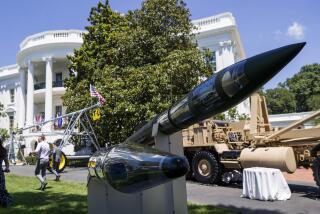U.S. to Send Envoy to Mideast
WASHINGTON -- In an attempt to neutralize the “Israel factor” in any showdown with Iraq, President Bush announced Wednesday that the United States is dispatching a top envoy to try to jump-start the Middle East peace process.
Bush also pressed Israeli Prime Minister Ariel Sharon during talks at the White House to sit on the sidelines if a U.S.-led coalition launches a military offensive against Iraq. The president acknowledged publicly, however, that Israel has the right to retaliate if attacked.
“If Iraq attacks Israel tomorrow, I would assume the prime minister would respond. He’s got a desire to defend himself,” Bush said during a brief joint appearance before reporters in the Oval Office.
But U.S. officials cautioned that Bush was not offering a green light for retaliation, only an understanding of Israel’s defense concerns. A White House official also said that although the administration expects Israel to stay out of the fight, it knows the Israelis would be unlikely to remain passive if they are the victims of an unprovoked Iraqi missile attack.
The administration promised Sharon that if a war against Iraq is launched, he will be given more than the 48-hour notice that he received on the eve of Operation Enduring Freedom in Afghanistan last year, according to sources. Israel has asked for enough advance notice to prepare its defenses against possible Scud missile attacks by the Iraqis.
For Sharon, the focus of Wednesday’s talks was coordination in the event of a war against Iraq. But Bush emphasized the Arab-Israeli conflict -- an almost dormant foreign policy issue now despite the president’s controversial initiatives over the last year.
In June, Bush outlined a roadmap for a permanent peace, which included a call for the Palestinians to change their leadership in exchange for a promise of an independent state within three years.
The Bush administration is dispatching Assistant Secretary of State William J. Burns today on a two-week swing through the Middle East to generate movement, particularly in getting the Palestinians to reform their institutions and minimize the role of Palestinian Authority President Yasser Arafat.
Burns will travel to Israel, the West Bank, Egypt, Saudi Arabia, Syria, Lebanon, the United Arab Emirates, Qatar, Kuwait, Bahrain, Yemen and Oman, U.S. officials said.
The envoy will “work toward achieving concrete, real, objective, measurable reforms so that there’s a peaceful future for the region,” Bush said as he began talks with Sharon. Moderate Arab governments have been putting pressure on the administration to try to defuse tensions between Israel and the Palestinians.
In an effort to prod the peace process forward, Bush won agreement from Sharon to “consider favorably” the gradual return of millions of dollars in Palestinian tax revenue that has been collected by Israel and withheld since 2000, money the Palestinian Authority says it needs to alleviate the desperate economic conditions brought about by two years of fighting with Israel.
In exchange, Washington pledged full U.S. monitoring of the income “to ensure that these funds will only be used for the economic and civil activities of the Palestinian community, and to prevent the use of these funds for terrorist activity of any kind,” according to a joint statement.
Bush also pledged support for Israel if tensions heat up along the border with Lebanon, where there have been sporadic clashes with Hezbollah guerrillas backed by Iran and Syria.
“We are making it clear we will fight terror wherever it exists,” Bush said. “We expect Hezbollah not to attack our friend.”
The Bush-Sharon talks were the seventh meeting since the two leaders took office last year. It came at a time of unusual tensions in the relationship. The United States has been irritated by Israel’s defiance of its admonitions to end its siege of about half a dozen West Bank towns and by its destruction of Arafat’s headquarters in Ramallah.
Washington has also been concerned about the mounting impact of the humanitarian crisis among Palestinians: Unemployment and poverty are soaring, and malnutrition among children is rampant.
The Israeli leader praised the Bush administration’s close cooperation with Israel.
“I think that we never had such relations with any president of the United States as we have with you. And we never had such cooperation in everything as we have with the current administration,” Sharon told Bush in front of reporters.
Sharon also held talks Wednesday with Vice President Dick Cheney, National Security Advisor Condoleezza Rice and Defense Secretary Donald H. Rumsfeld. He is scheduled to meet with Secretary of State Colin L. Powell today.
More to Read
Get the L.A. Times Politics newsletter
Deeply reported insights into legislation, politics and policy from Sacramento, Washington and beyond. In your inbox three times per week.
You may occasionally receive promotional content from the Los Angeles Times.










